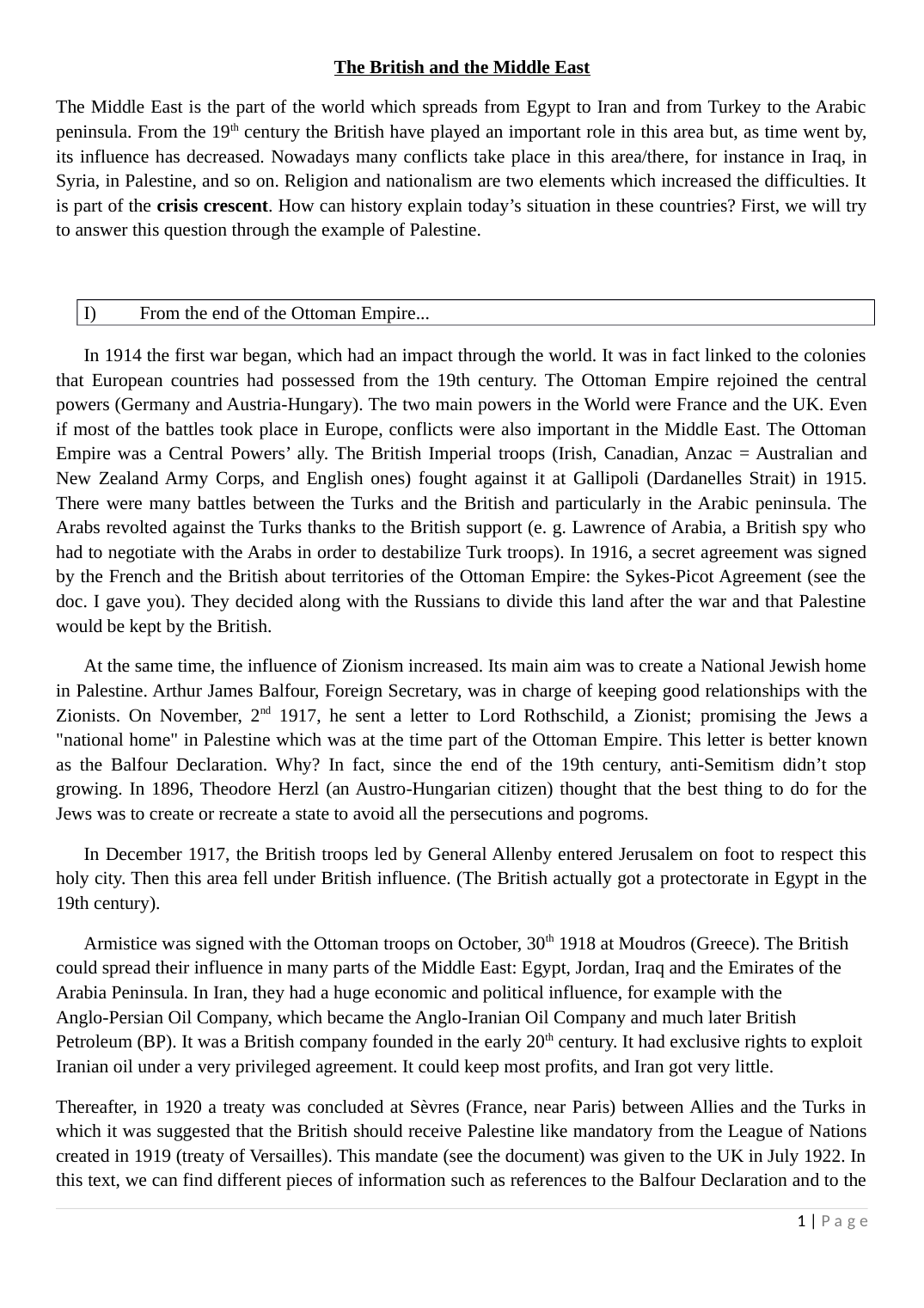Middle East
Publié le 23/05/2020

Extrait du document
«
The British and the Middle East
The Middle East is the part of the world which spreads from Egypt to Iran and from Turkey to the Arabic
peninsula.
From the 19 th
century the British have played an important role in this area but, as time went by,
its influence has decreased.
Nowadays many conflicts take place in this area/there, for instance in Iraq, in
Syria, in Palestine, and so on.
Religion and nationalism are two elements which increased the difficulties.
It
is part of the crisis crescent .
How can history explain today’s situation in these countries? First, we will try
to answer this question through the example of Palestine.
I) From the end of the Ottoman Empire...
In 1914 the first war began, which had an impact through the world.
It was in fact linked to the colonies
that European countries had possessed from the 19th century.
The Ottoman Empire rejoined the central
powers (Germany and Austria-Hungary).
The two main powers in the World were France and the UK.
Even
if most of the battles took place in Europe, conflicts were also important in the Middle East.
The Ottoman
Empire was a Central Powers’ ally.
The British Imperial troops (Irish, Canadian, Anzac = Australian and
New Zealand Army Corps, and English ones) fought against it at Gallipoli (Dardanelles Strait) in 1915.
There were many battles between the Turks and the British and particularly in the Arabic peninsula.
The
Arabs revolted against the Turks thanks to the British support (e.
g.
Lawrence of Arabia, a British spy who
had to negotiate with the Arabs in order to destabilize Turk troops).
In 1916, a secret agreement was signed
by the French and the British about territories of the Ottoman Empire: the Sykes-Picot Agreement (see the
doc.
I gave you).
They decided along with the Russians to divide this land after the war and that Palestine
would be kept by the British.
At the same time, the influence of Zionism increased.
Its main aim was to create a National Jewish home
in Palestine.
Arthur James Balfour, Foreign Secretary, was in charge of keeping good relationships with the
Zionists.
On November, 2 nd
1917, he sent a letter to Lord Rothschild, a Zionist; promising the Jews a
"national home" in Palestine which was at the time part of the Ottoman Empire.
This letter is better known
as the Balfour Declaration.
Why? In fact, since the end of the 19th century, anti-Semitism didn’t stop
growing.
In 1896, Theodore Herzl (an Austro-Hungarian citizen) thought that the best thing to do for the
Jews was to create or recreate a state to avoid all the persecutions and pogroms.
In December 1917, the British troops led by General Allenby entered Jerusalem on foot to respect this
holy city.
Then this area fell under British influence.
(The British actually got a protectorate in Egypt in the
19th century).
Armistice was signed with the Ottoman troops on October, 30 th
1918 at Moudros (Greece).
The British
could spread their influence in many parts of the Middle East: Egypt, Jordan, Iraq and the Emirates of the
Arabia Peninsula.
In Iran, they had a huge economic and political influence, for example with the
Anglo-Persian Oil Company, which became the Anglo-Iranian Oil Company and much later British
Petroleum (BP).
It was a British company founded in the early 20 th
century.
It had exclusive rights to exploit
Iranian oil under a very privileged agreement.
It could keep most profits, and Iran got very little.
Thereafter, in 1920 a treaty was concluded at Sèvres (France, near Paris) between Allies and the Turks in
which it was suggested that the British should receive Palestine like mandatory from the League of Nations
created in 1919 (treaty of Versailles).
This mandate (see the document) was given to the UK in July 1922.
In
this text, we can find different pieces of information such as references to the Balfour Declaration and to the
1 | P a g e.
»
↓↓↓ APERÇU DU DOCUMENT ↓↓↓
Liens utiles
- East London.
- Carl Sandburg1878-1967Poète du Middle-West industriel, il est l'auteur d'une grande biographie d'Abraham Lincoln(1926-1939).
- Léonide Illitch Brejnev par Roger PethybridgeCentre of Russian and East European
- Walter Raleigh: vers 1554-1618Né dans le Devon, Walter Raleigh poursuivit des études à Oxford puis à la faculté de droitde Middle Temple.
- Christabel (1787)Part I'Tis the middle of night by the castle clock,And the owls have awakened the crowing cock;Tu--whit!


